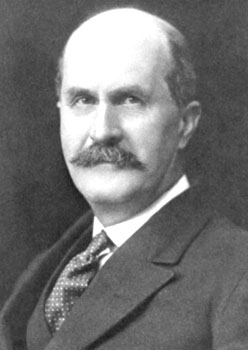| William Bragg  AKA William Henry Bragg AKA William Henry Bragg
Born: 2-Jul-1862
Birthplace: Wigton, Cumberland, England
Died: 12-Mar-1942
Location of death: London, England
Cause of death: Heart Failure
Gender: Male
Religion: Anglican/Episcopalian
Race or Ethnicity: White
Sexual orientation: Straight
Occupation: Physicist Nationality: England
Executive summary: Analyzed crystal structures British scientist William Bragg pioneered solid-state physics, and conducted early and important research on the determination of crystal structures. In 1912 his son, physicist Lawrence Bragg, discovered the Bragg law of X-ray diffraction, and after this the Braggs, father and son, worked together to design the first ionization spectrometer, predecessor of modern x-ray and neutron diffractometers. With this machine they observed and analyzed the molecular structure of crystals, establishing the new field of X-ray analysis of crystal structure, and in 1915 they became the first and only parent and offspring to share a Nobel Prize for the same work. The elder Bragg's other research focused on alpha radiation, hydrophones for military applications, and the structure of diamonds. His father-in-law was the astronomer Sir Charles Todd (1826-1910). Father: Robert John Bragg (farmer)
Mother: Mary Wood Bragg (vicar's daughter, d. 1869)
Wife: Gwendoline Todd Bragg (artist, b. 1869, m. 1889, d. 1929)
Son: William Lawrence Bragg (physicist)
Daughter: Gwendoline Bragg Caroe (b. circa 1907)
Son: Robert Charles Bragg (d. 2-Sep-1915 World War I)
High School: King William College, Isle of Man (1881)
University: BS Mathematics, Trinity College, Cambridge University (1884)
University: MA Physics, Trinity College, Cambridge University (1886)
Professor: Mathematics and Physics, University of Adelaide (1886-1908)
Professor: Cavendish Professor of Physics, University of Leeds (1909-15)
Professor: Quain Professor of Physics, University College London (1915-25)
Professor: Fullerian Professor of Chemistry, Royal Institution (1925-42)
Nobel Prize for Physics 1915 (with Lawrence Bragg)
Matteucci Medal 1915 (with Lawrence Bragg)
Rumford Medal 1916
Commander of the British Empire 1917
Knight of the British Empire 1920
Copley Medal 1930
Hughes Medal 1931
Order of Merit 1931
Australian and New Zealand Association for the Advancement of Science
Royal Institution of Great Britain
Royal Society 1906 (President 1935-40)
Author of books:
Studies in Radioactivity (1912, non-fiction)
X Rays and Crystal Structure (1915, non-fiction, with Lawrence Bragg)
The World of Sound (1920, collected lectures)
Concerning the Nature of Things (1925, collected lectures)
Creative Knowledge: Old Trades and New Knowledge (1926, non-fiction)
An Introduction to Crystal Analysis (1928, textbook)
The Universe of Light (1933, non-fiction)
Requires Flash 7+ and Javascript.
Do you know something we don't?
Submit a correction or make a comment about this profile
Copyright ©2019 Soylent Communications
|